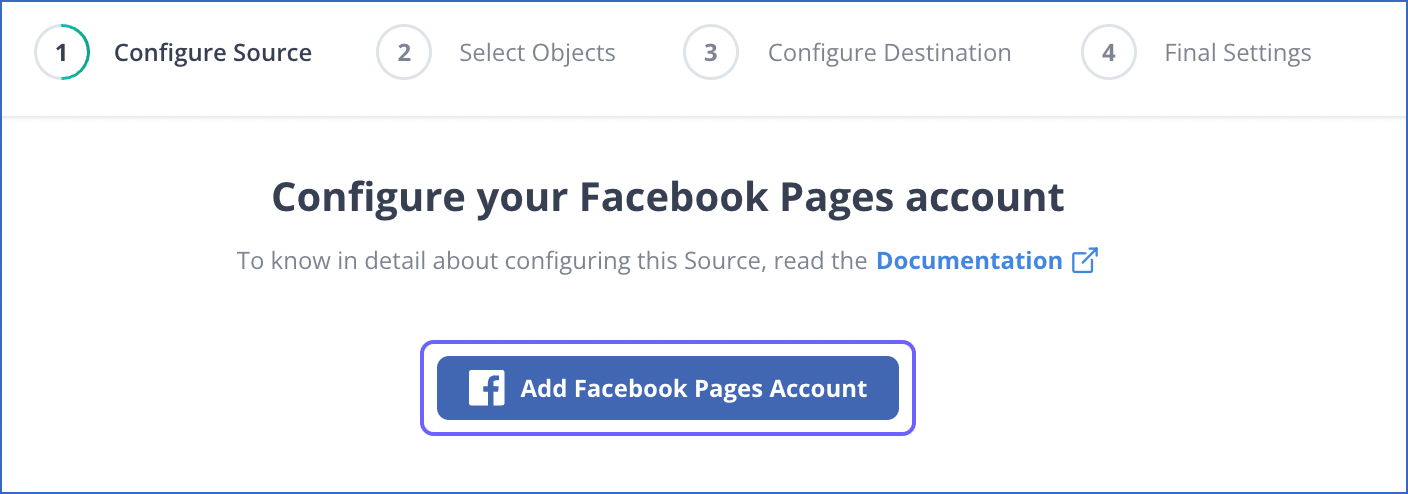Facebook Page Insights
On This Page
From Release 2.31.2, Hevo has upgraded to v21.0 of the Marketing API. You may need to reauthorize Hevo for existing Pipelines. Refer to section, Configuring Facebook Pages as a Source for the authorization steps.
The new API version has removed the following:
-
All metrics associated with these objects:
Objects Metrics Page Call Phone Clicks - page_call_phone_clicks_logged_in_unique Page Consumption - page_consumptions_by_consumption_type
- page_consumptions_by_consumption_type_unique
- page_consumptions_uniquePage Feedback - page_negative_feedback
- page_negative_feedback_by_type
- page_negative_feedback_by_type_unique
- page_negative_feedback_uniquePage Get Direction Clicks - page_get_directions_clicks_logged_in_unique Page Places Check In - page_places_checkin_total
- page_places_checkin_total_uniquePage Tab Views - page_tab_views_login_top
- page_tab_views_login_top_unique
- page_tab_views_logout_topPage Website Clicks - page_website_clicks_logged_in_unique Note: Hevo no longer supports ingesting data for the metrics listed in the tables above. As a result, the corresponding Destination tables are not updated, and these objects are excluded from the Data Model.
-
Specific metrics associated with these objects:
Objects Metrics Page CTA Clicks - page_cta_clicks_logged_in_total
- page_cta_clicks_logged_in_uniquePage Fans - page_fans_online
- page_fans_online_per_dayPage Impressions - page_impressions_organic_unique_v2
- page_impressions_by_country_unique
- page_impressions_by_city_unique
- page_impressions_by_locale_unique
- page_impressions_organic_v2
- page_impressions_by_story_type_unique
- page_impressions_by_story_type
- page_impressions_viral_frequency_distribution
- page_impressions_by_age_gender_uniqueNote: Hevo no longer supports ingesting data for the metrics listed in the tables above, so the corresponding Destination columns are also not updated.
Facebook Pages uses Facebook’s Marketing API to fetch insights data for a Facebook page as a whole (such as followers and impressions), and for page posts (such as likes, shares, comments, and video plays). You can replicate the data of one or multiple Facebook pages, including details such as posting and activity history, page insights including page views, post impressions, and insights on posted stories or Ads to a Destination database or data warehouse using Hevo Pipelines.
The Facebook Pages admin user must authorize Hevo to access the Facebook Pages APIs for reading the page and posts-related insights data for the selected pages.
Note: The data is ingested only for posts made by the page owner.
Limitations
-
All page data is limited to the past two years due to Facebook Pages API limitations.
Note: To fetch data for
daily_pageorunique_pagemetrics for a period more than three months, change the position of the object to any past date up till two years from the current date, in the Pipeline Overview page. -
Hevo does not load data from a column into the Destination table if its size exceeds 16 MB, and skips the Event if it exceeds 40 MB. If the Event contains a column larger than 16 MB, Hevo attempts to load the Event after dropping that column’s data. However, if the Event size still exceeds 40 MB, then the Event is also dropped. As a result, you may see discrepancies between your Source and Destination data. To avoid such a scenario, ensure that each Event contains less than 40 MB of data.
Revision History
Refer to the following table for the list of key updates made to this page:
| Date | Release | Description of Change |
|---|---|---|
| Jul-07-2025 | NA | Updated the Limitations section to inform about the max record and column size in an Event. |
| Jan-07-2025 | NA | Updated the Limitations section to add information on Event size. |
| Jan-06-2025 | 2.31.2 | Updated the warning container in the page overview to include information about the upgrade to Marketing API v21.0. |
| Nov-05-2024 | NA | Added a note in the Configuring Facebook Pages as a Source section to indicate that enabling Advanced Protection requires reauthorizing Hevo for existing Pipelines. |
| Aug-29-2024 | NA | Updated section, Limitations to remove the limitation on ingesting post data and metrics only from the last 90 days. |
| Jul-01-2024 | 2.25 | Updated the page overview to: - Add a warning container to inform about the upgrade to Marketing API v19.0, - Remove the note about the upgrade to Marketing API v18.0. |
| Mar-05-2024 | 2.21 | Updated the ingestion frequency table in the Data Replication section. |
| Jan-29-2024 | 2.19.3 | Added a note in the page overview about the Marketing API v18.0 update. |
| Oct-03-2023 | NA | Updated the se |
| Oct-03-2023 | NA | Updated the section, Configuring Facebook Pages as a Source as per the latest Facebook UI. |
| Feb-20-2023 | NA | Updated section, Configuring Facebook Pages as a Source to update the information about historical sync duration. |
| Sep-05-2022 | NA | Updated section, Data Replication to reorganize the content for better understanding and coherence. |
| Dec-06-2021 | 1.77 | Updated the Data Model section to correct the definitions of Lifetime Post Metrics and Unique Page Metrics. |
| Oct-25-2021 | NA | Added the Pipeline frequency information in the Data Replication section. |
| Jul-26-2021 | NA | Added a note in the Overview section about Hevo providing a fully-managed Google BigQuery Destination for Pipelines created with this Source. |






